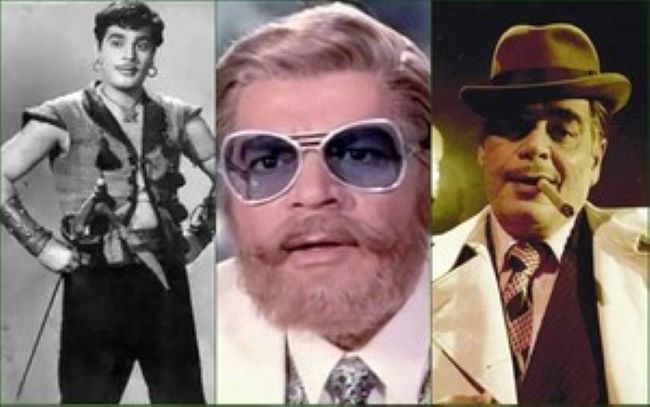BY VIKAS DATTA
New Delhi, Oct 22 (IANS) Like many other starstruck youths, he came to Bombay with dreams of becoming a hero, banking on his imposing stature, rough-hewn looks, and a baritone voice. He did succeed in his aim, but only partially, for most of his films sank without a trace, and playing second leads was no consolation.
It was only by crossing the moral line – onscreen – did Ajit make his name in Hindi films – of a larger than life, deep-dyed, but suave and sophisticated villain. He was always clad in the height of fashion – with accessories like outsized sunglasses, accompanied by glamorous molls, and scorned to do the dirty work himself, relying on a cohort of henchmen.
He complemented the entire package by lowering his trademark voice to a beguilingly softer, yet with sinister undertones, conveying both menace and mockery.
Be it the nasal languid drawl call out to moll “Mona Darling” or henchman “Raabatt” (Robert), telling his enemy how “Sara shahr mujjhe Loin ke naam se jaanta hai” or many other catchphrases as he played mind games with heroes, police, and other enemies, Ajit, who passed away this day (October 22) in 1998, revolutionised the image of the screen villain in his lasting legacy to Hindi cinema.
This represented a dramatic change for someone whose early stint in the Hindi film industry had him play the hero opposite the cherubic Nalini Jaywant, the angelic Madhubala, the petite Suraiya, and the immensely talented Meena Kumari, among others.
Born Hamid Ali Khan in Golconda in a Pathan family in 1922 in what were then dominions of the Nizam of Hyderabad, he had barely envisioned a film career as his father, who served in the Nizam’s army, wanted him to become a doctor or a lawyer. However, Ajit, who was naturally intelligent and had a gift for languages, was indifferent in studies.
As the story goes, one of his exasperated teachers at the University Arts & Science College, Warangal – where his senior was P.V. Narasimha Rao – advised Ajit to give up studies, and either join the army like his father or become a film actor.
Ajit took him1 at his word, lied to his father that he had passed his exams, sold his textbooks, and with the Rs 113 they fetched him, left for Bombay in the early 1940s.
However, in Bombay, Ajit found the going tough. As his money ran out, he recounted later that his acquaintances offered him as job as a rent collector or a gateman at a cinema, where he might catch the eye of a film director. However, the proud Pathan refused such jobs and hung on – though his circumstances sank to such depths that he had to perforce make his home in the huge cement pipes placed at various places in the city.
He soon landed some small roles in films which earned him Rs 3 or maybe, Rs 6. K.L. Saigal-starrer “Kurukshetra” (1956) was his first major role. One director then noticed him and offered the lead role in a swashbuckler “Shah-e-Misr” (1945) but it proved to be a flop.
It was this time that some directors he worked with including Nanabhai Bhatt (father of Mahesh Bhatt) suggested he change his name to better register with the audience and filmmaker K. Amarnath suggested that Ajit would suit his personality.
Ajit did work with all leading heroines of his time, save Nargis, but most of the films are obscure, save “Beqasoor” (1950) with Madhubala, “Anand Math” (1952), “Nastik” (1954) – in which Kavi Pradeep’s self-rendered elegy “Kitna badal gaya insaan” is picturised on him – and “Hulagu” (1956), where he serenades Meena Kumari with Rafi’s splendid “Aaja ke intezar mein” while a ferociously scowling Pran plays the eponymous Mongol ruler, and “Char Dil Char Rahen” (1959).
Lack of success as hero meant Ajit had to shift to playing second leads – most notably in “Naya Daur” (1957) and as the loyal Durjan Singh in “Mughal-e-Azam” (1960).
It was close friend Rajendra Kumar who suggested Ajit switch to playing leading villains in place of supporting heroes, and Ajit began with the former’s costumed thriller “Suraj” (1966).
This was a turning point, and his particular brand of villainy was in display in “Prince” (1969 as the evil mamaji, “Heer Raanjha” (1970), and then, most spectacularly as Dharam Dayal Teja, the “Cold Old Man” against the “Angry Young Man” in “Zanjeer” (1973) as DinDayal/”Loin” in “Kalicharan” (1976), and many others.
Soon playing the stern Amil Balban in “Razia Sultana” (1983), Ajit took a sabbatical from films, due to his health and concern at the current state of the industry, and settled down in Hyderabad. He did make a sporadic return in the 1990s but was mostly retired before he passed away in 1998.





